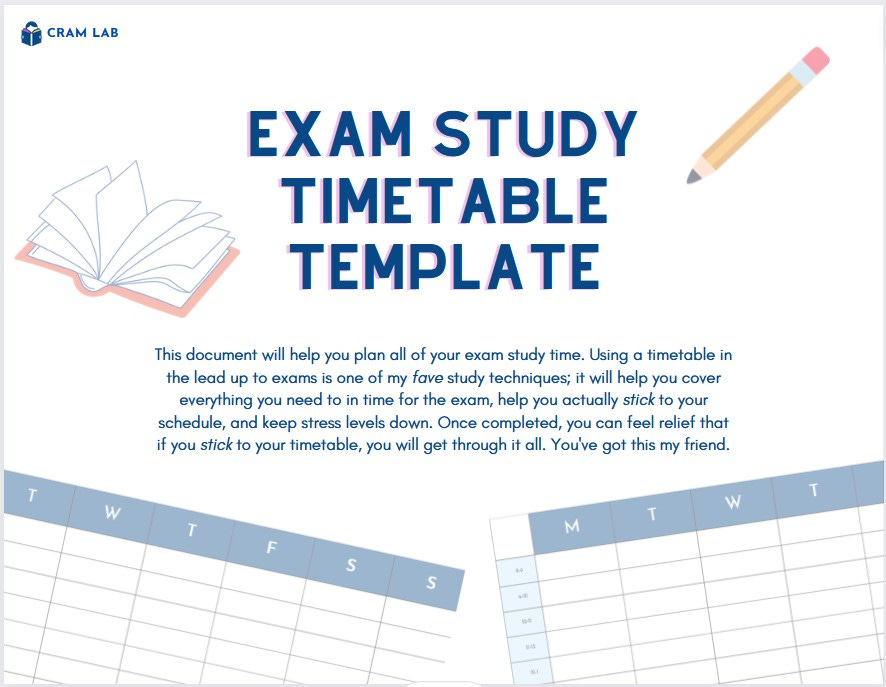How to get even the most disengaged teen over to their study desk
My 5 favourite study tips for getting teens motivated and organised
Hi there,
Let’s get straight into it.
Half the battle with studying is starting.
I have talked about this and how to boost productivity before, but today I want to share my practical tips for motivating even a completely unmotivated teen and helping them to bring some organisation to their study.
Because if we can reduce the obstacles that hinder your teen from starting, this will make the entire studying process a whole lot easier.
Having a study space that works for them
Unlike the homogenised earthy tones of social media, I am here to simply say, that your teen needs to figure out what study environment works for them.
Primarily I mean the room they study in and the desk they sit at.
I don’t care if their desk is Instagram-worthy. I don’t even care if it’s messy. Mine certainly wasn’t tidy all the time… in fact it was a darn right mess sometimes.
In fact — a messy desk can be a sign of a study frenzy!!
What I do care about is whether their study environment is helping or hindering them to study effectively.
Some students study effectively in a more orthodox study environment — a desk in their bedroom, laptop on the desk, books and papers stacked to one side, walls adorned with flow charts and cork boards. Perhaps they’re listening to music; perhaps they prefer complete silence.
Other students might absorb, process and retain information best while sprawled horizontal across the lounge floor, surrounded by bits of paper.
Some students might get bored of one spot and prefer to mix things up like musical rooms! Some might opt for their school library somtimes, which can help minimise the distractions that would otherwise be at home. Others prefer the familiarity and privacy of home.
At the least, I just want your teen to start developing some awareness of what study environment might help them concentrate the best, and what type of set up works for them, be it a desk, the dining room table, or the library.
Adopting the pain vs pleasure mindset
Don’t worry, I’m not about to pretend to be a psychologist. But I do want to share a simple strategy that worked really well for motivation.
As an adult, you probably already use it all the time without even realising…
It would be disingenuous to teenagers to pretend that studying is a super fun time all the time. Yes it can be satisfying and rewarding, but sometimes, maybe even a lot of the time, it’s really not what they feel like doing.
Heck — a lot of teens might never feel like studying!
When I was studying, I didn’t always want to do it. Particularly during exam study, studying is a real slog! Hours and hours a day! Not even the most studious teenager is going to be psyched to study during exams.
So how can we help teenagers to overcome their negative feelings about studying, their procrastination, and get stuck into some productive study?!
Rather than thinking about the immediate pain of studying when I didn’t feel like it, I trained myself to think about the pleasure that future Clare would feel once I had completed my study schedule for the day.
This is basically a delayed gratification technique, and it’s one that I use almost every day, even now.
For instance, not many adults get excited about doing what we call ‘life admin’ in our house, but we know that if we don’t do it, things will be a lot worse later on.
So for your teen, I want them to start changing their thinking from I don’t feel like studying, to, it’s going to feel amazing to tick off my study tasks for the day.
I want them to start thinking about their future selves. That’s who they should be studying for. Not because of Mum and Dad’s nagging, but for themselves.
Experiencing some short term ‘pain’ now is a whole lot better than even more pain down the track — like the pain of having to cram because you’ve left studying until the last minute, or the pain of not being prepared for an exam, or the pain of getting a bad grade.
Shifting their mindset from thinking about the pain of studying to the pleasure of the rewards that come with getting their study on track has further spinoff benefits.
Taking positive steps with their studying will instil in your teen a sense of accomplishment.
And, they will be able to enjoy their study break times and weekends off etc guilt-free! Having tasks hanging over your head feels awful, whereas getting done what you need to done feels amazing.
Figuring out their ideal ‘study chunk’
Generic study advice often asserts that the optimal length of time to study is somewhere between 20 and 45 minutes.
This might be true for some teens, but it’s way too simplistic to be true for all.
We are not robots. We are all different and students study most effectively in their own unique way.
While one teen might study for 30 minutes effectively before their concentration wanes, others might be able to go for two hours before they need a break.
Rather than putting a rigid timeframe on how long your teen should study for, it’s much more important that your teen starts to develop an awareness of when they are concentrating and smashing out some productive studying, and when they are actually just starting at the walls (or more likely their phone).
Sometimes I would struggle to get through half an hour of productive study before needing a little break. Other times, I would hit that sweet spot, get in the zone and power through three hours of studying before peeling my eyes away from my study notes.
What we want your teen to avoid, is long periods of time when they are not concentrating, because this is when motivation and productivity takes a nose dive, which can create a negative feedback loop.
My suggestion for your teen is that they aim for a ‘chunk’ of time they are likely to be productive for, and go for it during that time. It’s helpful while studying to have little mini ‘goals’ to work towards, and then to be rewarded with a break.
Structuring study sessions by ‘chunks’ of time is a really simple technique, but it can turn the daunting task of studying for an undefined period of time into a much more managable, achievable task that is peppered with little rewards throughout the session.
For more detail on how to get the most out of study ‘chunks’ check out this previous article:
Start with the worst part
We all procrastinate stuff we don’t like doing. But ya know what feels amazing? Getting tasks we don’t particularly enjoy out of the way.
The same applies to studying.
If your teen hates maths, I suggest they start their maths homework first when they get home from school, or when they’re sitting down to do serious study in the lead up to exams.
If your teen has an essay to write and it’s worrying them that they haven’t start — start there. Write an essay plan. Write one paragraph. Get over the initial hurdle that’s making them feel anxious and then they can bask in the sweet release and freedom of getting it done.
This ties in with the pain versus pleasure mindset discussed above.
Even if your teen isn’t going to enjoy the task in the short term, once it’s done they will feel a sense of accomplishment which will boost their motivation and confidence and they can move on to the next task while firing on all cylinders.
Putting stuff away
I know I know, this is super simple, and maybe you’re already super organised and do this without even thinking about it.
But it was something I heard about only a few years ago and it has really helped me to keep organised and tidy. Well, tidier at least.
And I think it can help your teen.
It’s the most simple tip in the world: When you’re done using something, don’t just dump it wherever you find yourself; put it away in its rightful place.
For your teen, this means putting away their school bag, their books, their laptop, their class notes, their stationery — as soon as their done with them.
This prevents doubling up on putting stuff away. If they get into the habit of putting things in their rightful place right away, there’s no putting it down in the wrong place, only to have to move it later.
This is also a massive help for preventing misplacing items, which we all know, is incredibly frustrating. WHERE THE HELL ARE MY KEYS??!!!
The other added benefit of this super simple tip is the stress it saves. Clutter and disorganisation take up real estate in our minds. It’s hard to feel organised mentally when our physical space is a mess.
Having a place for all of their study stuff will help your teen not just organise their physical space, but their mental space.
When it’s time to study, they won’t have the added stress of not knowing where stuff is, and not having to declutter their desk before they have even started, which is a crappy way to start a study session.
I can’t remember who I have to credit with telling me about this super simple tip, but I am very grateful. I hope your teen finds it as effective as I do.
Your teen doesn’t need to take all of these techniques on board right away.
As we all know, changing habits is a process and it doesn’t happen overnight.
If your teen is really struggling with their studying, very unmotivated etc, they won’t be able to adopt all of these techniques overnight. Improvement and progress is what we’re going for.
You have to be realistic about where your teen is at, and what’s a win for them.
They might want to pick one technique and work on that for a while before incorporating others.
In saying that, these are techniques that any student can incorporate into their study lives.
I really hope they help your teen to get more organised and fight that all too familiar procrastination.
Wishing your teen the best of luck,
Clare
P.S. I’d love to hear how your teen is going — are they disorganised? Is this something they really struggle with? Does it affect their motivation? What’s worked for you and your family? What’s not worked?! Let’s talk it out in the comments below.
P.P.S. If you haven’t grabbed yours already I have a number of free resources for your teen over at cramlab.org/free-downloads, including an Exam Study Timetable template for mapping out their exam study.





